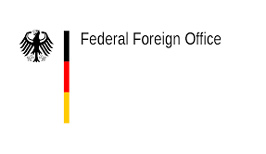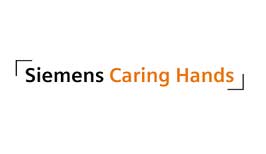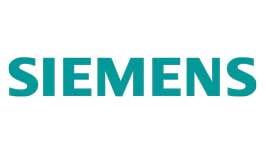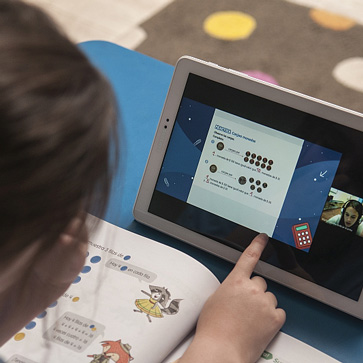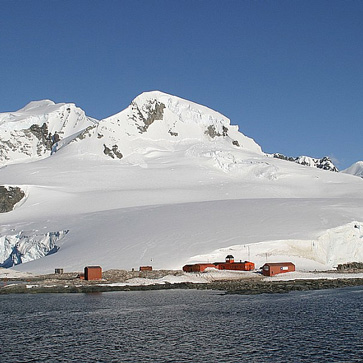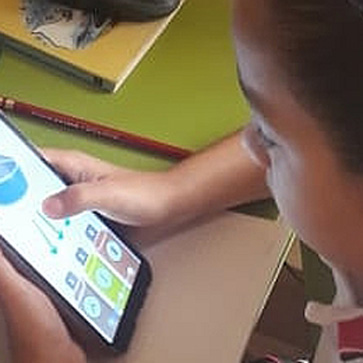STEM Education for Innovation
Education initiative in Latin America
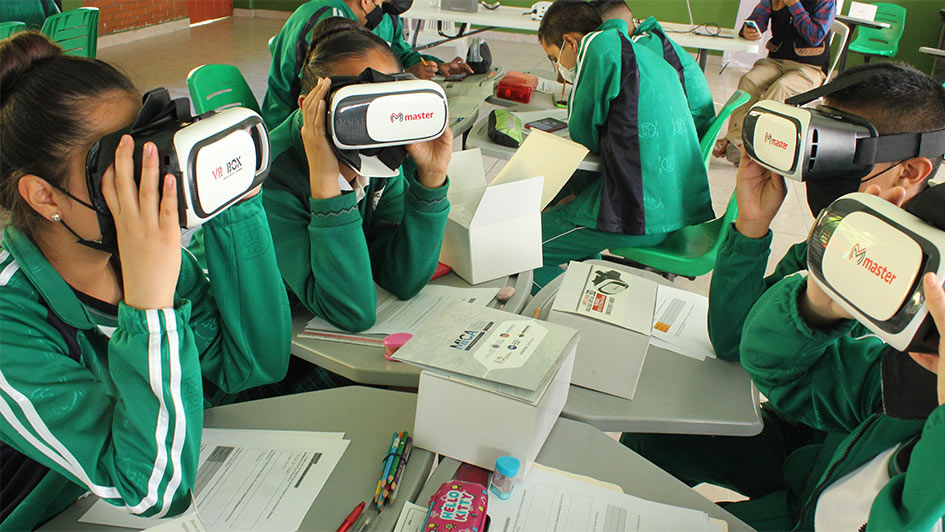
Embracing the future: Digital STEM education initiative in Latin America
If a pandemic strikes and pupils are unable to attend school, with just a computer, tablet or smartphone as their only link with school – if such a link exists at all – what are the most effective ways for teachers to continue their work? Siemens Stiftung has worked together with various partner institutions and education ministries across Latin America in search of answers to this question. Within a year, our partnership with local experts had laid the foundations for an education initiative to promote innovative STEM education in partnership with institutions and teachers in seven Latin American countries.
Innovative STEM education for digital lessons
We have teamed up with local partners in Chile, Colombia, Mexico, Argentina, Peru, Brazil and Ecuador to adapt teaching materials and methods for use in digital STEM lessons on subjects such as science, technology, sustainability, climate change, health and digitalization. Supported by Siemens Caring Hands e.V. and coordinated by Siemens Stiftung, this partnership has produced:
- 400 open license digital and analog teaching materials (OER – Open Educational Resources) for the entire education chain (including teachers and students of all age groups)
- Redecanedu – a growing collaborative network connecting deans of education faculties at over 30 universities in 13 countries
- A growing network of virtual learning communities for teachers across six countries in Latin America to date
- A certified learning program for teachers
- Regional workshops to improve teaching on STEM subjects, climate change, health and sustainability
You can find all teaching and learning media under an open license on our CREA (Centro de Recursos Abiertos) education portal.
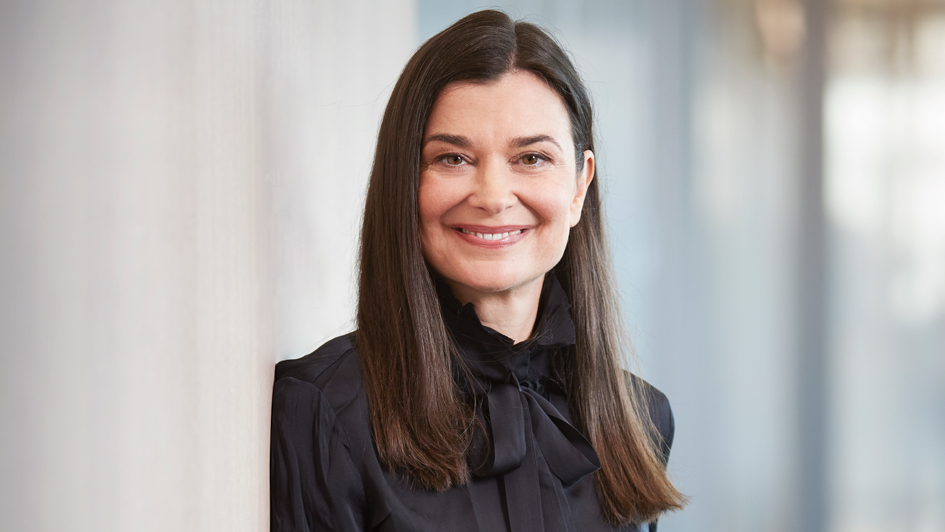
“Sustainable education can only succeed if we work together. Our initiative is creating a strong Latin American network – for today and for the future.”
Dr. Nina Smidt, Managing Director of Siemens Stiftung
The crisis as an opportunity, sustainable education as a goal
In 2021 alone, 100 web-based seminars provided more than 300,000 teachers across Latin America with training on innovative STEM content and methods. The insights and expertise they gained will shape the STEM teaching received by hundreds of thousands of pupils in seven Latin American countries. The educational resources arising from the initiative will be continuously integrated CREA, the Latin American media portal coordinated by Siemens Stiftung.
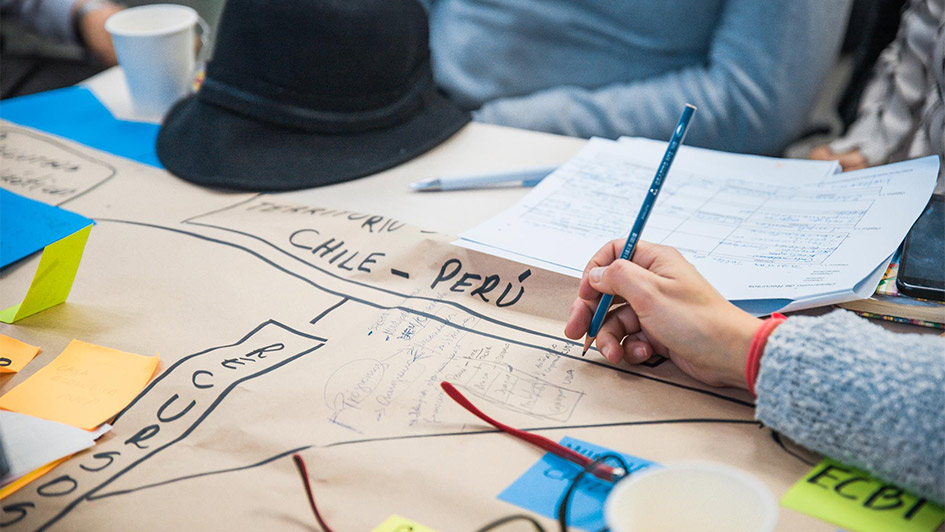
Blended learning materials for STEM education beyond the pilot phase
Following the end of the pilot phase in 2022, the partners concentrated their combined efforts on distributing the open access educational resources and formats developed by the initiative to teachers, pupils, educational institutions and other educators across Latin America. They also endeavored to embed them in curricula with the support of national educational authorities. This ultimately extended the resources’ reach to millions of teachers and pupils across the entire continent. Promoting inter-institutional cooperation and engagement from regional stakeholders will be crucial to ensure that the initiative’s resources and methods become a long-term fixture in practice in school teaching. The STEM network Red STEM Latinoamérica, is also coordinated by Siemens Stiftung. At present, it includes over 180 institutions from 13 countries and serves as a central hub helping to establish the initiative’s content.
Project partners in seven Latin American countries
In total, 14 projects in Chile, Colombia, Ecuador, Argentina, Mexico, Peru and Brazil have been coordinated by Siemens Stiftung and piloted locally by partner institutions. The teaching and learning materials developed in the initiative will be integrated gradually into regional curricula and enter into widespread use throughout the network. The project partners are already working together with partner institutions in various countries, thereby supporting interregional cooperation from the outset.
In the first step of this project, coordinated by the Centro de Investigación Didáctica de las Ciencias y Educación STEM (CIDSTEM) at Pontifica Universidad Católica de Valparaíso (PUCV), 650 science teachers in ten Latin American countries took part in a survey that systematically explored their experiences of teaching during the pandemic, covering both the challenges and examples of best practice. Based on the insights gained, a team of educational experts from the participating countries then created more than 80 new materials on blended-learning teaching. This work was coordinated by CIDSTEM and created videos, exercise sheets and teachers’ guides on the topics of the environment, health and energy. The materials link to local contexts and are inclusive, taking the diversity of their target locations into account. The materials are now freely available on the Centro de Recursos Educativos Abiertos (CREA) platform and have been publicized by the Red STEM Latinoamérica network established by Siemens Stiftung.
Centro de Investigación Didáctica de las Ciencias y Educación STEM (CIDSTEM)
MICA, an interactive map about climate change, is a project coordinated by the Center of Research and Didactics of Sciences and STEM Education (CIDSTEM). It was developed in 2018 by geographers, digitalization experts and CIDSTEM at Pontificia Universidad Católica de Valparaíso (PUCV) and consists of printable folding maps accompanied by a smartphone app with texts, videos, audio files, images, 3D objects and links to regional information about climate change. These materials can be used in both a classroom setting and remote learning situations. Young people are taught to observe and document facts and learn through active participation about the impacts of climate change on specific regions. As part of the education initiative, MICA prototypes were expanded to five territories in five countries, while learning boxes were assembled with climate maps and two dozen learning sequences. The apps for each region are available free of charge from the usual app stores.
KEICA (Kit Escolar de Investigación Científico Ambiental) is a scientific, technological and educational program to encourage examination of local socio-environmental problems and participation in environmental measurement and monitoring processes, both in school education and in wider society. It uses methods from STEM education, which enhances project-based learning and the creates links with the school curriculum, while creating a close relationship with the local environment. As part of the initiative, 24 teachers from 12 schools in Chile, Colombia, Peru and Mexico took part in an initial pilot program, along with 120 pupils. They collected and analyzed environmental data from publicly accessible sources (such as journal articles and regional documents) with support from experts. The five resulting learning modules are based on real regional data – ranging from air pollution in Coyhaique, Chile, to waste and recycling issues on Colombian beaches. These modules are set to be made freely available in future on KEICA Territory – a new, dedicated interactive platform – along with an extensive archive of data and information.
This project is coordinated by the Centro de Investigación de Estudios Avanzados de Educación at the Universidad de Chile (CIAE) and the Programm Educación en Ciencias basado en la Indagación (ECBI) at the University of Chile. It develops and adapts digital materials and handouts about climate change for blended learning lessons at schools and educational authorities. It draws on existing materials, including from the International Conferences for Education on Climate Change and Sustainable Development, which were organized by Universidad de Chile, CR2, Siemens Stiftung, OCE and UNESCO. In addition to the free lesson materials, the project also developed training course for teachers on blended learning. This work included surveying 125 teachers from the Red STEM Latinoamérica network about their priorities in climate change teaching, based on what was relevant for their respective regions. It is hoped that, in the future, the resulting digital course will be certified by education authorities and used in teacher training across Latin America, so that its content can be integrated into individual countries’ curricula.
Centro de Investigación de Estudios Avanzados de Educación (CIAE)
This is a project by the Faculty of Education at Pontifica Universidad Católica de Chile. In collaboration with more than 100 teachers, it developed digital materials and teaching formats for all grade levels for use in education for sustainable development (ESD). The materials include podcasts featuring interviews with teachers from Peru, Colombia, Chile and Mexico about innovative ideas for digital lessons during a pandemic; how-to videos for creating affordable instruments for measuring environmental data such as water quality, energy models, and air pollution; videos with insights from science and education experts about socio-ecological challenges in a variety of ecosystems; audio capsules that explain to teachers and students how they can use innovative techniques to conduct research in their region, and infographics outlining regional challenges based on the SDGs. The materials cover didactic methods such as project-based learning, hyperlocal teaching and design thinking. This project is coordinated by CIDS UC (an interdisciplinary group working on sustainability education at Campus Villarrica of Pontificia Universidad Católica de Chile).
A growing network of deans of education faculties at leading Latin American universities was established in 2021. The Redecanedu network aims to serve as a space for Latin American education faculties to share expertise in order to increase the use of innovative practices in teacher training and professional development, especially in relation to STEM education. Since the network was established, it has organized a seminar on teacher training, sponsored two inter-university research projects, arranged a conference for all Redecanedu participants and conducted a survey on teacher training during the pandemic at the participating universities. The network, which now includes over 34 deans from 13 countries, holds regular digital meetings, seminars, research projects and conferences to discuss research, analysis and joint initiatives in relation to education in general. These formats also allow the deans to identify challenges, find potential solutions and discuss aspects of regional and national policy, such as climate change, digital teaching, diversity, interculturality, access to education and educational justice – during and following the pandemic.
This project is coordinated by Universidad de Antioquia, Colombia. Computational thinking is increasingly finding its way into the curricula of different types of school, meaning that pupils are analyzing computer logic and applying this process to solve specific problems. Based on an analysis of documentary materials and an analysis of existing challenges in the integration and development of computational thinking in primary and subsequent education in Latin America, experts at the Colombian university worked with specialists in other Latin American countries to develop OER teaching materials and workshops in order to help teachers develop and implement modules on computational thinking. The project has also produced independent learning modules on computational thinking and STEM for teachers. Teachers and pupils can engage with computational thinking and STEM methodologies in Spanish and Portuguese-language webinars.
This project is a collaboration between the medical and educational faculties at Universidad de la Sabana. Prosalud is part of a comprehensive health strategy that seeks to create a greater impact on community health by using learners as multipliers to spread the health lessons learned in school to their families. In addition to nutrition, exercise, rest and environmental consciousness, the lessons also cover socio-political awareness and participation. In a pilot program, more than 130 teachers from six schools in four municipalities of Colombia’s La Sabana Centro province received training on Prosalud. Digital teaching modules, handouts and videos were specially produced for teachers and their pupils. In the subsequent “Challenge Experience” – a school competition that aimed to find solutions for specific health-related problems – the pupils already demonstrated better knowledge of health-related habits and health-promoting strategies and activities. The experts also developed further Open Educational Resources (OER) for digital, synchronous and asynchronous learning. These included a virtual teaching program comprising five courses and ten hours of lessons, podcasts with associated activities in different difficulty lessons, and a podcast with an activity guide for parents and the community. The full range of OER is now available for free on the Centro de Recursos Educativos Abiertos (CREA) platform. The pilot program has already reached 6,000 school pupils – with plans to extend the reach of Prosalud even further in the future.
This project is coordinated by Pontificia Universidad Bolivariana. It supports the development of a regional network of teachers called NetSTEM, focusing on STEM teaching and education for sustainable development (ESD) with information and communication technology. It brings together teachers from Mexico, Colombia, Peru, Argentina, Chile and Brazil with the aim of improving STEM education in these countries and foster networking. In a preparatory digital course, 50 teachers with experience and an interest in the subject worked together with the aim of teaching collaboratively and digitally as multipliers of STEM content. Moving forward, they have committed to pass their insights on to other teachers through NetSTEM in self-organized regional teaching groups. Using design thinking, the six national learning groups have already conducted a supraregional STEM education project on the topic of water use. The teachers have documented the network’s progress to date in 250 short videos, which are available online – on the NetSTEM website and on YouTube.
This project is coordinated by Universidad San Francisco de Quito and was developed in close collaboration with specialists in Colombia and Chile, who provided pedagogical and didactic input. It links the insights and methods of education for sustainable development (ESD) with indigenous knowledge from Ecuador’s native peoples. Based on a similar project in Colombia, the project has created educational packages for school pupils aged 8 to 15. These materials focus on biodiversity and indigenous culture and were developed with the help of approaches from the international education program Experimento. Each package contains a video, a teacher’s guide and interactive components, which will be made available for free on the CREA platform in future and are set to be included in Ecuadorian school curricula.
Siemens Solid Edge is a software for creating and manufacturing products. It includes tools for 3D design, simulations, production, data processing, and more. A free version of Solid Edge is already being used in 70 countries by more than one million learners. In this project from Fundación Siemens Argentina, around 300 teachers from Argentina, Mexico, Columbia, Peru, Guatemala and Chile were trained to use the Solid Edge software along with more than 1,500 students at Argentinian technical schools. The young people are already applying the insights they gained: for example, working together with experts, they are using Solid Edge to develop sanitary systems with drinking water suppliers for various needy communities in Buenos Aires. The project is designed to strengthen technical education at secondary schools in Argentina, with a particular emphasis on digital skills. The blended learning materials developed for the initiative are freely available on CREA and include video learning capsules, didactic PDF building blocks and handbooks – which have already been downloaded by over 1,000 teachers and learners. In the “Solid Edge for Social Impact” project, Fundación Siemens Argentina has team up with institutions in Mexico, Chile and Colombia.
This project is led by the INNOVEC initiative, a nonprofit committed to improving STEM education in public schools. In the first year of the project, INNOVEC hosted a series of online seminars, workshops and modules and showed 130,000 teachers and political decision-makers from across Latin America how they can implement digital STEM education with blended Open Education Resources (OER). These events introduced the teachers to CREA (Centro Recursos Educativos Abiertos – Open Educational Resources Center) and teaching materials that have been adapted to the curricula of each country. In addition, with the support of regional education ministries and representatives, the project created workshop modules and organized online workshops and in-person events that have already been attended by around 1,000 primary and secondary school teachers from Mexico, Ecuador, Peru and Colombia. INNOVEC has already produced audiovisual learning capsules with teaching guides for STEM, sustainable development and health education – which are now available on the CREA platform.
The Faculty of Education of the Pontificia Universidad Católica del Perú coordinated the development and implementation of a certified advanced training course for teachers, based on online autodidactic modules. The course aims to promote STEM competencies (digital skills, critical thinking, ethical and responsible actions) in teaching methods. Each unit contains an OER package (comprising videos, guides and more) that has been tested by a pilot group of 120 Peruvian teachers, reviewed by educational experts and is now available for free on the CREA platform. One of the Peruvian Education Ministry’s main priorities was to ensure that the pilot group of teachers produced a multiplier effect by establishing train-the-trainer expertise in different parts of the country. For this commitment during the pandemic, Siemens Stiftung was officially recognized by the Ministry of Education as an “Aliado por la Educación” (Ally for Education).
The Associação do Laboratório de Sistemas Integráveis Tecnológico (LSI-TEC), an association affiliated with the University of São Paulo, have established a local education network called STEAM Territory São Paulo. It is also supported by the USP Polytechnic School and the Ministry of Education for the State of São Paulo. The network’s objective is to facilitate exchange, collaboration and improvements in relation to in science, technology, engineering, arts and mathematics (STEAM) teaching in public schools. STEAM Spaces – physical spaces that facilitate practice-oriented STEAM education connected to the respective local context – also strengthen the regional network. The STEAM Spaces implemented to date are pilot projects and will help to develop and produce guidelines for large-scale implementation and evaluation of STEAM Spaces in schools. The aim is to foster affordable, easy-to-implement solutions for public schools in Brazil and beyond. It is hoped that creating cost-efficient models for STEAM Spaces will promote equal opportunities in education. As part of this approach, an online course has been set up to train teachers on what STEAM Spaces and how to design, apply and manage them. The content is based on the national Brazilian curriculum (BNCC) and is available in Portuguese on APICE, a MOOC platform operated by LSI-TEC, and in an adapted Spanish version on the CREA platform. Schools participating in the project receive cost-effective science and technology kits and support implementing the necessary infrastructural changes. The STEAM Territorio São Paulo is part of the Red STEM Latinoamérica network, which spans the entire continent.
An education network spanning Latin America
Partners
An education network spanning Latin America
Political and economic support
“Now is the time to support innovative learning methods that provide all children and young people with access to quality education.”
Prof. Dr. Stephan Frucht, member of the Board of Directors of Siemens Caring Hands e. V. Tweet

“I am delighted that the donations from the relief fund will go toward initiatives like this incredible education project in Latin America.”
Judith Wiese, member of the Managing Board and Chief Human Resources Officer at Siemens AG Tweet
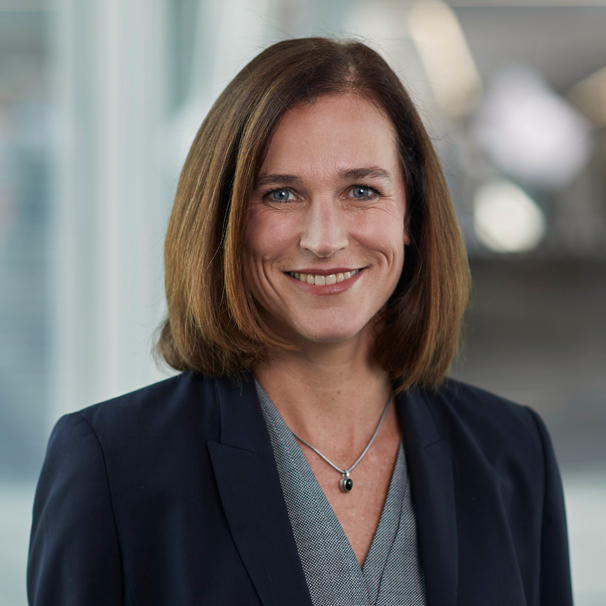
Teaching and learning during the pandemic and the future of digital education – stories of the new normal in kindergartens and schools
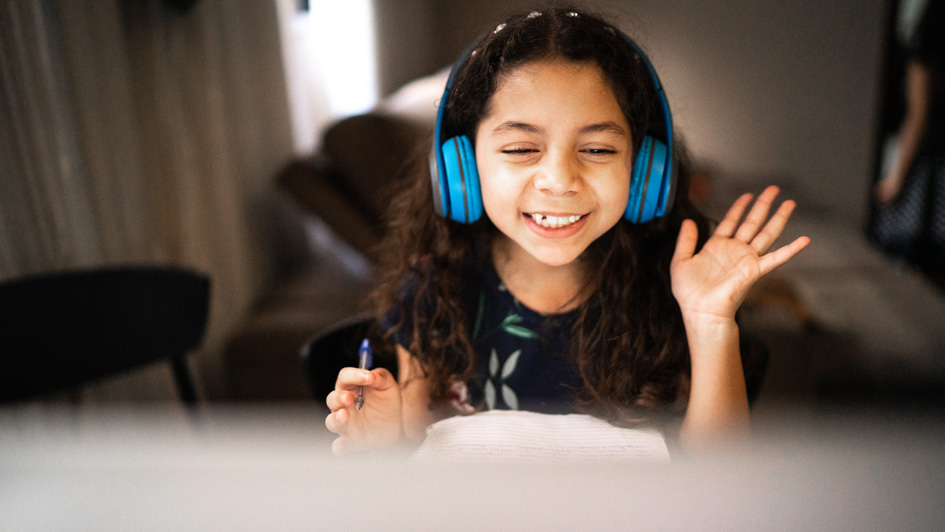
The COVID-19 pandemic turned teaching and learning on its head all over the globe. Teachers had to learn – essentially overnight – how to maintain contact with their students online. This transition had its share of technical hurdles to overcome, but it was also a challenge to implement familiar learning methods in a new online environment. Since December 2020, the Latin America-wide STEM Education for Innovation initiative, with the financial support of the nonprofit Siemens Caring Hands e.V., has introduced a number of projects and innovative teaching and learning materials that are now seeing heavy use in kindergarten and school classrooms. In our #STEMeducation4innovation interview series, five teachers share stories of how the pandemic changed their working lives – and how digital education can succeed.
Creativity sparks curiosity – even online
María Marcela Vargas Fernández teaches 32 preschool children aged five to six at the Escuela República de Brasil in Santiago, Chile. “It’s ‘full Zoom’ for us this year,” she reports. “Unfortunately, my school did not purchase a license, so we are working with the free Zoom version. This means our lessons are at most 40 minutes long. While this may seem like a very long attention span for five- to six-year-olds, we were surprised to discover that as the months went by, more and more children started to log on. The screen is a hive of activity, the classes are incredibly interactive.”
Even small teams stick together: creating cohesion through collaboration
Emma Janelle UC Artigas coordinates certification and continuing education for teachers at the state secretary of primary school education within the education ministry of Veracruz, Mexico. “Teachers’ initial reactions were varied,” she says in an interview. “Most thought the pandemic would be over quickly. When they realized it would take a while, they became worried and nervous. Many became depressed.”
Welcome to Antarctica: with school closed, the world is a classroom
Recently, Jessica Espinoza Fuentes said: “Kids, today we’re going to learn about water and its different forms. We’ve been invited to the Chilean Antarctic Territory by the head of the base there. It’s really cold, much colder than it is in the morning in Sebastián when the ‘vaguada’ – thick coastal fog – winds its way through the streets. Everybody needs to dress warm. Don’t forget your hat, scarf, and your winter jacket.” One by one, I held these items in front of the screen and saw the children do the same.
The joy of seeing children grow and succeed
Irene del Carmen Santos Cruz teaches in a suburb of Xalapa City, the capital of the Mexican state of Veracruz. Her students come from families without a steady income. “When the coronavirus hit last year, I conducted a survey and found out that only two of my students had a computer. The rest had to use a mobile phone to participate in the lessons, and in many cases, they had to share that device with other members of their family.”
No internet, no cell reception: Teaching in a mobile classroom
Selene Esparza teaches migrant children in Mexico. Often, they have no access to a classroom, let alone internet or mobile phone reception. “The circumstances of these children and adolescents are representative of about half of all students in Latin America. Digital learning is not an option for them,” she says. “On my first day, I was handed the key to the premises. I opened the railway car and then sat down to take it all in. I thought to myself: So, this is it. I am sitting way out here among the tomatoes, beans, and chilis. Computers and the internet won’t work here.”



